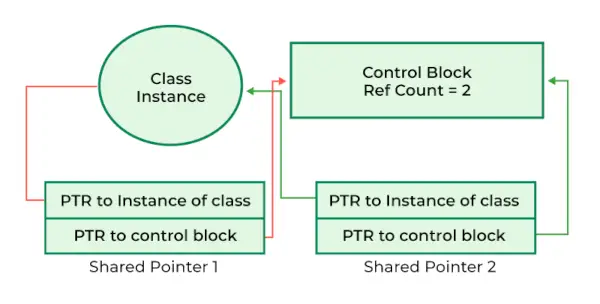std :: shared_ptr est l'un des pointeurs intelligents introduits dans C++11. Contrairement à un simple pointeur, il est associé à un bloc de contrôle qui assure le suivi du nombre de références pour l'objet géré. Ce décompte de références est partagé entre toutes les copies des instances shared_ptr pointant vers le même objet, garantissant ainsi une gestion et une suppression appropriées de la mémoire.
Conditions préalables: Pointeurs en C++ , Pointeurs intelligents en C++ .

Pointeur partagé en C++
Syntaxe de std :: shared_ptr
Le shared_ptr de type T peut être déclaré comme :
std::shared_ptr ptr_name;>
Initialisation des objets shared_ptr
Nous pouvons initialiser le shared_ptr en utilisant les méthodes suivantes :
1. Initialisation à l'aide d'un nouveau pointeur
shared_ptr ptr (new T()); shared_ptr ptr = make_shared (new T());>
2. Initialisation à l'aide du pointeur existant
shared_ptr ptr(already_existing_pointer); shared_ptr ptr = make_shared(already_existing_pointer);>
Méthodes membres de shared_ptr
Voici quelques membres associés à shared_ptr :
| Méthode | Description |
|---|---|
| réinitialiser() | Réinitialise le std::shared_ptr à vide, libérant ainsi la propriété de l'objet géré. |
| use_count() | Renvoie le nombre de références actuel, indiquant combien d'instances std::shared_ptr partagent la propriété. |
| unique() | Vérifiez s'il n'y a qu'un seul std::shared_ptr propriétaire de l'objet (le nombre de références est 1). |
| obtenir() | Renvoie un pointeur brut vers l'objet géré. Soyez prudent lorsque vous utilisez cette méthode. |
| échanger(shr_ptr2) | échange le contenu (propriété) de deux instances std::shared_ptr. |
Exemples de std :: shared_ptr
Exemple 1:
C++
>
>Sortir
0x1365c20 A::show() A::show() 0x1365c20 0x1365c20 2 2 0 1 0x1365c20>
Exemple 2 :
C++
// C++ program to illustrate the use of make_shared> #include> #include> using> namespace> std;> int> main()> {> >// Creating shared pointers using std::make_shared> >shared_ptr<>int>>shr_ptr1 = make_shared<>int>>(42);> >shared_ptr<>int>>shr_ptr2 = make_shared<>int>>(24);> >// Accessing the values using the dereference operator> >// (*)> >cout << 'Value 1: ' << *shr_ptr1 << endl;> >cout << 'Value 2: ' << *shr_ptr2 << endl;> >// Using the assignment operator (=) to share ownership> >shared_ptr<>int>>shr_ptr3 = shr_ptr1;> >// Checking if shared pointer 1 and shared pointer 3> >// point to the same object> >if> (shr_ptr1 == shr_ptr3) {> >cout << 'shared pointer 1 and shared pointer 3 '> >'point to the same object.'> ><< endl;> >}> >// Swapping the contents of shared pointer 2 and shared> >// pointer 3> >shr_ptr2.swap(shr_ptr3);> >// Checking the values after the swap> >cout << 'Value 2 (after swap): ' << *shr_ptr2 << endl;> >cout << 'Value 3 (after swap): ' << *shr_ptr3 << endl;> >// Using logical operators to check if shared pointers> >// are valid> >if> (shr_ptr1 && shr_ptr2) {> >cout << 'Both shared pointer 1 and shared pointer '> >'2 are valid.'> ><< endl;> >}> >// Resetting a shared pointer> >shr_ptr1.reset();> }> |
>
>Sortir
Value 1: 42 Value 2: 24 shared pointer 1 and shared pointer 3 point to the same object. Value 2 (after swap): 42 Value 3 (after swap): 24 Both shared pointer 1 and shared pointer 2 are valid.>
Exemple 3 : Implémentation d'une liste chaînée à l'aide de std::shared_ptr
C++
#include> #include> using> namespace> std;> // Define a singly linked list node> struct> Node {> >int> data;> >shared_ptr next;> >Node(>int> val)> >: data(val)> >, next(NULL)> >{> >}> };> class> LinkedList {> public>:> >LinkedList()> >: head(NULL)> >{> >}> >// Insert a new node at the end of the linked list> >void> insert(>int> val)> >{> >shared_ptr newNode = make_shared(val);> >if> (!head) {> >head = newNode;> >}> >else> {> >shared_ptr current = head;> >while> (current->suivant) {> >current = current->suivant;> >}> >current->suivant = nouveauNoeud;> >}> >}> >// Delete a node with a given value from the linked list> >void> del(>int> val)> >{> >if> (!head) {> >return>;> >}> >if> (head->données == val) {> >head = head->suivant;> >return>;> >}> >shared_ptr current = head;> >while> (current->suivant> >&& current->suivant->données != val) {> >current = current->suivant;> >}> >if> (current->suivant && actuel->suivant->données == val) {> >current->suivant = actuel->suivant->suivant;> >}> >}> >// Traverse and print the linked list> >void> Print()> >{> >shared_ptr current = head;> >while> (current) {> >cout current = current->suivant; } cout<< 'NULL' << endl; } private: shared_ptr head; }; int main() { LinkedList linkedList; // Insert nodes into the linked list linkedList.insert(1); linkedList.insert(2); linkedList.insert(3); // Print the linked list cout << 'Linked List: '; linkedList.Print(); // Delete a node and print the updated linked list linkedList.del(2); cout << 'Linked List after deleting 2: '; linkedList.Print(); return 0; }> |
>
couverture rigide ou livre de poche
>Sortir
Linked List: 1 ->2 -> 3 -> Liste chaînée NULL après suppression de 2 : 1 -> 3 -> NULL>
